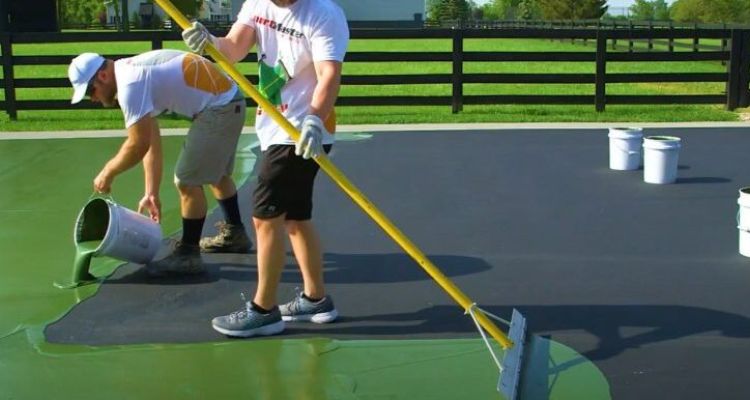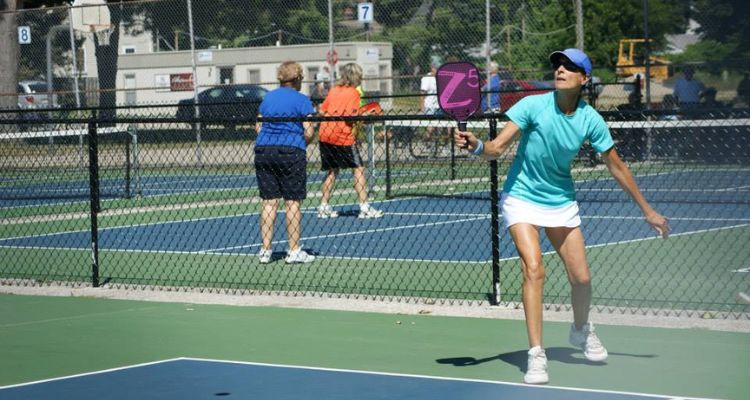Play Pickleball on Concrete: Pros, Cons, and Safety Considerations
Are you a pickleball fan looking to try something new? Perhaps you’re curious about this rapidly expanding sport. In either case, you might be wondering if you can play pickleball on concrete. Well, wonder no more! This article will cover the specifics of playing pickleball on concrete surfaces.
Let’s first address the question at hand: Can pickleball be played on concrete? The answer is a resounding yes! Playing on concrete can actually improve your game. However, there are some unique considerations to keep in mind for safety and performance.
When playing on concrete surfaces, the balls bounce higher compared to grass or sand. This means players must adjust their swing and approach to maintain control of the ball. Additionally, players should wear cushioned footwear with appropriate support to protect their joints from impact-related injuries while on the court.

Playing Pickleball on Concrete
It’s important to note that concrete can become slippery when wet or covered in dew, so extra caution is necessary while navigating the court. Falls can lead to serious injury if proper safety precautions are not taken. However, with the right equipment like non-slip shoes and durable paddles, pickleball can still be enjoyable on well-maintained concrete courts.
Why should you play pickleball on concrete? Well, playing on concrete offers several advantages over other surfaces. Concrete provides a consistent surface, allowing players to predict the ball’s flight and spin, giving them an edge in their game. Additionally, concrete allows for fast-paced play with little risk of injury due to its evenness and durability. It’s perfect for competitive play or simply having fun with friends.
Another advantage of playing on concrete is that it requires less maintenance compared to other surfaces like asphalt or hardwood courts. This means you can spend more time playing pickleball and less time worrying about upkeep.
Despite these benefits, playing on concrete does have its drawbacks. The lack of cushioning can increase the risk of injuries, especially from falls or collisions with other players. Concrete courts also tend to produce faster ball speeds, which can put strain on players’ bodies over time. Additionally, the maintenance costs of concrete courts can be higher compared to other options.
Raw concrete is commonly used for construction, but it’s not the best choice for pickleball courts. It has a rough texture that can be abrasive to players’ feet, lacks cushioning, and doesn’t provide the necessary traction for smooth play. Additionally, raw concrete absorbs solar heat, making it uncomfortable during hot summer days.
For these reasons, materials like asphalt or synthetic turf are better choices for constructing safe and comfortable pickleball courts.

FAQs
Can you play pickleball on the driveway?
Absolutely! Pickleball can be played on any level, hard surface such as a patio or driveway. It’s easy to set up and play, as long as you have the specialized equipment like paddles and balls.
What is the best surface for a pickleball court?
The best pickleball surfaces are made from rugged, non-abrasive materials like concrete or asphalt. These surfaces offer a fast, level playing area that is easy to maintain and can withstand wear and tear. Painted outdoor courts with a two-part epoxy coating are also popular due to their consistent bounce and ball speed.
What type of floor is pickleball played on?
Pickleball is typically played on a flat, hard surface like a tennis court, gym floor, or concrete. It can also be played on grass or asphalt outdoors.
Can you play pickleball on asphalt?
While it’s possible to play pickleball on asphalt, it’s not advised due to the rough surface and lack of padding. This increases the risk of injury.
Conclusion
To wrap up, pickleball can indeed be played on concrete surfaces with the right considerations. Use soft or non-abrasive balls and racket materials, wear shoes with good grip, and ensure there’s enough room for all players. With these precautions in place, you can enjoy a fantastic game of pickleball on concrete courts!




